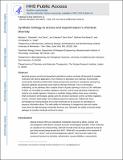Synthetic biology to access and expand nature's chemical diversity
Author(s)
Smanski, Michael J.; Zhou, Hui; Claesen, Jan; Shen, Ben; Fischbach, Michael A.; Voigt, Christopher A.; ... Show more Show less
DownloadSynthetic biology.pdf (1.424Mb)
OPEN_ACCESS_POLICY
Open Access Policy
Creative Commons Attribution-Noncommercial-Share Alike
Terms of use
Metadata
Show full item recordAbstract
Bacterial genomes encode the biosynthetic potential to produce hundreds of thousands of complex molecules with diverse applications, from medicine to agriculture and materials. Accessing these natural products promises to reinvigorate drug discovery pipelines and provide novel routes to synthesize complex chemicals. The pathways leading to the production of these molecules often comprise dozens of genes spanning large areas of the genome and are controlled by complex regulatory networks with some of the most interesting molecules being produced by non-model organisms. In this Review, we discuss how advances in synthetic biology — including novel DNA construction technologies, the use of genetic parts for the precise control of expression and for synthetic regulatory circuits — and multiplexed genome engineering can be used to optimize the design and synthesis of pathways that produce natural products.
Date issued
2016-02Department
MIT Synthetic Biology Center; Massachusetts Institute of Technology. Department of Biological EngineeringJournal
Nature Reviews Microbiology
Publisher
Nature Publishing Group
Citation
Smanski, Michael J. et al. “Synthetic Biology to Access and Expand Nature’s Chemical Diversity.” Nature Reviews Microbiology 14.3 (2016): 135–149.
Version: Author's final manuscript
ISSN
1740-1526
1740-1534